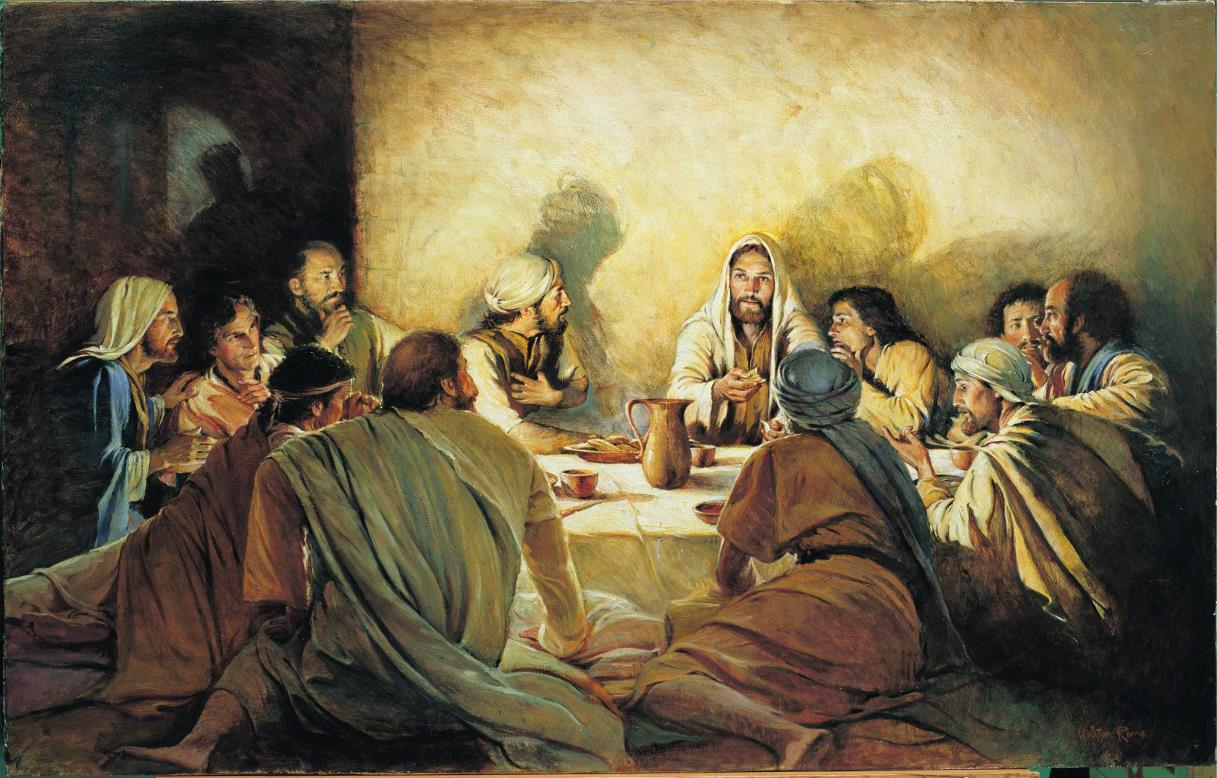Holy Supper
Why does the Lord call the bread and wine His flesh and blood?
And as they were eating, Jesus took bread, and blessed, and broke, and gave to the disciples and said, Take, eat; this is My body. And He took the cup, and gave thanks, and gave to them, saying, Drink ye all from it; for this is My blood of the new covenant which is poured out for many for the remission of sins (Matt 26:26–28).
That the Lord so spoke, namely, that He called the Divine good that proceeds from Him His “flesh,” and the Divine truth that proceeds from His Divine good His “blood,” was because the Word, which is from Him, was the Divine that fills the universal heaven. Such a Word must exist by means of correspondences; consequently it must must be representative and significative in each and all things, for thus and no otherwise it conjoins the men of the church with the angels in the heavens (AC 10033:9).
All that is holy in heaven proceeds from the Lord’s Divine Human, and therefore all that is holy in the church. Therefore that violence might not be done to it, the Holy Supper was instituted by the Lord, in which it is expressly said that the bread is His flesh, and the wine His blood, thus that it is His Divine Human from which the holy then comes.
With the ancients, flesh and blood signified the human proprium*, because the human consists of flesh and blood. Thus the Lord said to Simon, “Blessed art thou, for flesh and blood has not revealed it to thee, but My Father who is in the heavens” (Matt. 16:17). The flesh and the blood, therefore, signified by the bread and the wine in the Holy Supper, denote the Lord’s Human Proprium.
The Lord’s Proprium Itself, which He acquired to Himself by His own power, is Divine. His Proprium from conception was what He had from Jehovah His Father, and was Jehovah Himself. Hence the Proprium that He acquired to Himself in the Human was Divine. This Divine Proprium in the Human is what is called His flesh and blood; “flesh” is His Divine good, and “blood” is the Divine truth of Divine good (AC 4735).
As regards “flesh,” in the supreme sense it signifies the Proprium of the Lord’s Divine Human, which is Divine good; and in the relative sense it signifies the proprium of man’s will made alive by the Proprium of the Divine Human, that is, by His Divine good. This proprium is what is called the heavenly proprium, which in itself is the Lord’s alone appropriated to those who are in good, and thence in truth. Such a proprium have the angels who are in the heavens, and men who as to their interiors or as to the spirit are in the Lord’s kingdom (AC 3813).
But if anyone is so simple as to be unable to think from his understanding of anything except what he sees with the eye, I advise him, when he takes the bread and wine and hears them called the Lord’s flesh and blood, to think within himself of the holy supper as the holiest thing of worship, and to call to mind Christ’s passion, and His love for man’s salvation; for He says,
This do in remembrance of Me (TCR 709).
This also may be illustrated by comparisons. Who does not remember and love the man who, from zealous love for his country, fights against her enemies even unto death, that he may thereby free her from the yoke of slavery? Who does not remember and love the man who, seeing his fellow citizens in extreme want and dying before his eyes in the relentless grip of famine, brings forth from his house all his silver and gold and freely distributes it? Who, again, does not remember and love the man who, out of pure love and friendship, takes the only lamb he possesses, kills it, and sets it before his guests? And so on (TCR 710).
* Proprium means what is one’s own, that makes us who we are, that is, our character or identity, our self. Since all good is from the Lord, no one but the Lord truly has proprium, or what is His own. But the Lord works for us to have a good character or heavenly proprium as our own.
Questions
- Is it important to use the words, “flesh and blood” in the service?
- Does it make sense to think of eating up the Lord’s love and drinking in His wisdom to make them a part of our spiritual body, thus who we are?
- Can you picture eating up a new, heavenly proprium from the Lord?
- How much should we try to duplicate the original administration of the Holy Supper by the Lord, or its administration in the early Christian Church?
- In what sense are we to remember Christ’s passion (that is, His suffering the cross) in receiving the holy supper? In what ways are we not to think of it?
| previous |  |
next |
|---|


